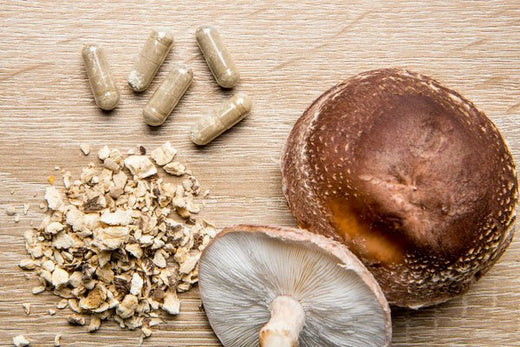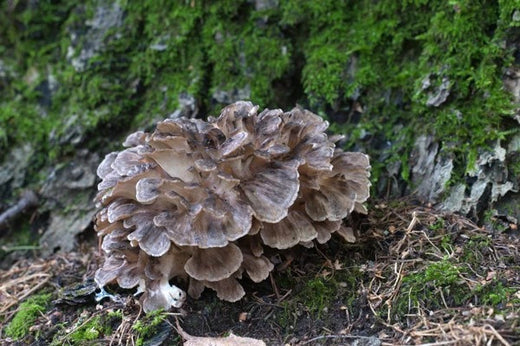Shielding Your Body From Seasonal Change | Simple Prevention Guide

Each of us has a preferred time of year, be it the heat of summer, the crisp autumn air, the chill of winter, or the rejuvenating feeling of spring.
Looking back at our forebears, they exhibited an impressive level of adaptation to the changing seasons that we seem to have lost in the present day. They lived in harmony with nature.
Their lifestyles shifted with the changing weather. They altered their diet according to the food available for hunting or foraging during each season. Their behaviours and routines also evolved, becoming more introspective in the colder months and outgoing in the warmer ones. They developed tools and strategies to enhance their survival prospects throughout the various seasonal transitions.
In contrast, many of us in today's world struggle with seasonal adaptability.
Our preference for constant comfort has overtaken our natural adaptability. We rely on modern amenities such as heating during winter and air conditioning during summer to maintain a constant comfort level.
It's easy to overlook the fact that our bodies are inherently equipped to adapt to seasonal changes, an essential process for maintaining our health and vitality.
In this piece, we'll delve into the effects of seasonal shifts on our bodies, what occurs within us as the seasons change, and the indicators suggesting that you may need additional support. We'll also introduce you to some potent immunity-boosting superfoods and medicinal mushrooms that can enhance your resilience, adaptability, and immune strength.
Table of Contents
-
Do Seasonal Changes Impact Our Bodies?
-
Changes | That Occur To Body During Seasonal Change
-
Immunity Downfall
-
Elevated Sensitivity to Allergies
-
Depletes Vitamin D From Body
-
Low Feel
-
7 Superfoods For Significant Immunity Strengthening
-
Reishi Mushroom
-
Turkey Tail Mushroom
-
Lion's Mane Mushroom
-
Ashwagandha Root
-
Pine Pollen
-
Bee Pollen
-
Proven Tricks Preventing You From Seasonal Change Impacts
-
Concluding
-
References
Do Seasonal Changes Impact Our Bodies?
During the chilly winter months, the colder air and reliance on indoor heating systems can lead to increased dryness of the skin and general dehydration.
Winter often sees a spike in eczema breakouts, as well as a rise in the prevalence of seasonal depression, or what is paradoxically known as SAD (seasonal affective disorder). This condition stems from a decrease in sun exposure, which, in turn, leads to diminished synthesis of vitamin D.
Winter is also associated with a higher incidence of colds and flu. This can be attributed to more time spent indoors in closer quarters, providing a more conducive environment for disease transmission. The cold, dry air can compromise our mucus membranes - our body's first line of defense - and many individuals tend to be more susceptible to illnesses due to increased fatigue and overall lowered immunity during this time.
As we transition into spring, instances of allergies and hay fever rise. Symptoms such as sinus congestion, runny noses, itchy eyes, rashes, eczema, and asthma can become more prevalent, indicating an overactive immune response.
During the summer months, the risk of dehydration increases due to the body's need to dissipate heat to maintain its ideal temperature. Therefore, there is a heightened emphasis on ensuring proper hydration during this period.
Summer is generally a favorite season for many, given the extended daylight hours and the energizing effect of the sun on our nervous systems.
The warmer weather encourages outdoor activities and exploration of nature, including beach visits, hiking, and camping. This outdoor exposure and increased social interaction can positively impact our immune systems in several ways.
Indeed, the changing seasons affect our bodies on multiple levels - physically, emotionally, mentally, and psychologically. Our connection with the environment and its cyclical patterns reflects a deeper symbiosis between us and the natural world around us.

Changes | That Occur To Body During Seasonal Change
The human body is continuously striving to achieve equilibrium, a condition known as homeostasis, which marks optimal operation and balance.
Any factor that disrupts this equilibrium, like a stressor, prompts the body to respond rapidly by deploying a range of biological tools, such as hormones, neurotransmitters, microbes, proteins, immune cells, and sensory receptors. These elements work collectively to induce the necessary biochemical and physical modifications, enabling us to regain balance.
Despite being an integral part of the natural world, contemporary lifestyles have often distanced us from this inherent connection. This disconnect is evident in the impact that seasonal transitions can exert on our health.
Historically, our predecessors employed natural solutions and habits to counterbalance the adverse effects associated with seasonal fluctuations.
For instance, in the colder months, they found it advantageous to consume animal fat, a natural source of vitamins A and D. These vitamins play a crucial role in immune system regulation. Additionally, they huddled around fires, where the smoke emanating from burning wood served as an organic antimicrobial agent, purifying the air and the surrounding environment.
It leads one to question whether our ancient ancestors suffered from allergies, which seems rather improbable.
In the present era, our gut microbes have adapted to a more sanitized environment that is constantly bombarded by processed foods, alcohol, synthetic pesticides, pollution, pharmaceuticals, and incessant stress.
Regardless, there are some fantastic tactics we can employ to aid our bodies during these seasonal shifts, which we are about to explore.

Immunity Downfall
Seasonal transitions can significantly strain and weaken our immune system due to alterations in our environment and daily habits.
A robust immune system is synonymous with a healthy gut, which serves as a major hub for the immune system. A substantial portion of our immunity, upwards of 80%, is housed within our gut.
The integral role of our intestines and the Gut-Associated Lymphoid Tissue (GALT) in our body's overall immune defense is undeniable. The GALT is home to numerous lymph nodes and immune cells spread throughout the gut, defending against foreign antigens and pathogens while maintaining tolerance to resident bacteria and dietary antigens.
Moreover, the Mucosa-Associated Lymphoid Tissue (MALT) forms the largest part of human lymphoid tissue. It is dispersed across the mucosal surfaces of our body, including the nose, eyes, mouth, skin, lungs, and in women, the vagina.
During winter, the combination of cold air and artificial heating dries out these mucus membranes and our skin. There's also a tendency to consume less water during colder months, further exacerbating the dehydration of these membranes. This consequently weakens our primary immune defense - our skin and mucous membranes, making us more susceptible to common illnesses like the cold or flu.
Stress also plays a substantial role as a prevalent factor in diminishing immune function.
Modern lifestyle elements such as traffic, work pressures, financial stress, interpersonal relationships, negative self-perception, nutrient deficiencies, gut health issues, and inadequate sleep can all contribute to stress.
Such stressors send signals to our body indicating a threat, leading many people to exist in a state of chronic stress, often without realizing it.
How often do we find ourselves falling ill after a social outing or succumbing to a cold or flu following a strenuous week at work?
Pathogens and viruses are omnipresent in our environment, existing around us, on us, and within us. We're only susceptible to illness when factors like stress compromise our immune system.
The common phrase "there's a cold/flu going around" during winter is often misleading.
The increased likelihood of falling ill during the winter months is more likely due to closer human contact, increased exposure to foreign bacteria and recycled air from heaters.
Poor dietary choices during winter can further weaken our immunity by negatively impacting gut health. Natural health boosters are also typically avoided during these months.
Moreover, our sleep quality tends to deteriorate in colder months. Despite darker mornings, our work schedules often require us to wake up early, disrupting our natural sleep patterns which are designed to coincide with sunlight exposure.
The combination of reduced contact with nature, decreased sunlight exposure, and resulting lowered vitamin D synthesis are additional factors that may impair immune function during seasonal transitions.

Elevated Sensitivity to Allergies
Allergies are, in essence, an overly responsive immune system rather than a sign of immunodeficiency.
The intricate interplay between our immune system and allergies is indeed compelling. In our early years, gut microbes play an important role in educating our nascent immune cells about what's harmful and what's benign, essentially differentiating friends from foes among various foreign bacteria and pathogens.
The genesis of allergies can often be traced back to a misinterpretation between these immune cells and gut microbes.
An allergic reaction is triggered when certain immune cells, notably mast cells, discharge histamine.
Histamine is a substance that aids in lymph flushing and irritation of the mucous membranes, essentially pushing the allergen out of the body.
Common allergy symptoms like itching in the eyes and throat, nasal discharge, cough, sinus blockage or inflammation, and congestion are simply our body's mechanisms to expel the allergen through our primary elimination organs.
Springtime is typically when allergies are most prevalent, as the changing weather, blooming flowers, and sprouting seeds lead to a surge in airborne pollen. However, changes in the environment and local flora with shifting seasons can also trigger allergies.
Furthermore, conditions such as intestinal hyperpermeability, often referred to as leaky gut, and a lack of microbial diversity in the gut are known to exacerbate and stimulate allergies. Additionally, if the liver is unable to effectively eliminate histamine from the body due to an unsupported DAO gene - this could be due to genetic predisposition or lifestyle factors - it can potentially worsen allergies.
Reishi, a renowned medicinal mushroom, is highly beneficial in managing allergy symptoms and promoting overall health.

Depletes Vitamin D From Body
Vitamin D, often referred to as a prohormone rather than a simple vitamin, is integral to our body's overall health and well-being.
This versatile prohormone is critical in several biological processes, including the mineralisation of bones, the regulation of cardiovascular health, the strengthening of the immune system, mood management, hormonal equilibrium, fertility enhancement, and promoting skin health, among many others.
The process of Vitamin D synthesis begins in the skin cells, or keratinocytes, when they are exposed to the sun's UV rays. This exposure transforms pre-vitamin D in our skin into a compound known as pro-vitamin D or 25-OHD. This is the active form of Vitamin D that our bodies utilize for various essential functions.
It's important to note that Vitamin D synthesis is largely dependent on sunlight exposure, and can thus be influenced by geographical location and the time of the year. During colder months and in regions with less year-round daylight, our bodies may struggle to generate adequate levels of Vitamin D.
This deficiency can have significant implications on our immune system's capacity to recognize and react to threats. Vitamin D's role extends to the production of crucial neurotransmitters, such as serotonin, by facilitating the conversion of tryptophan into serotonin.
Serotonin serves multiple roles in our bodies, not only in mood stabilization, but also in regulating appetite and promoting optimal sleep. Consequently, a dip in Vitamin D levels can negatively impact our ability to control our appetite and maintain healthy sleep patterns.
Given these potential implications, many health experts advocate for Vitamin D supplementation during periods of minimal sun exposure, such as the winter months. As an advocate for holistic nutrition, I would suggest getting a blood test to determine your Vitamin D levels. Following that, an appropriate dosage of Vitamin D supplements can be determined to either increase deficient levels or maintain optimal ones until adequate daily sun exposure is possible.

Low Feel
There's a fascinating connection between the changing seasons and our mood. The sight of the morning sun and the sky triggers the body to release hormones like dopamine, adrenaline, and cortisol.
These neurotransmitters and stress hormones act as catalysts, stirring motivation and action within us, thereby naturally enhancing our mood.
Moreover, the accomplishment of our tasks leads to a surge of dopamine, which further boosts our mood. This explains why the feeling of ticking off a critical task from our to-do list is so gratifying.
In contrast, during the winter months, when daylight hours are fewer, and the weather is often inclement with frequent rain or snow and more frequent cloud cover, there's a reduction in mood-enhancing compounds like dopamine. This natural decrease often leads to a drop in mood.
The summer season usually sees us more active and inspired. Yet, ironically, most individuals choose to take vacations during the summer rather than in the winter, a period when the body could benefit from more relaxation and less activity.
As a result, during winter, we often find ourselves working more, experiencing more stress, feeling more exhausted, and neglecting rest. We tend to exercise less and indulge in less healthy food choices during these colder months, reaching for "comfort foods" like high sugar foods and processed carbs.
Such unhealthy winter habits and poor choices lead to a reduction in beneficial gut bacteria that produce serotonin, a hormone that improves mood.
Therefore, it's crucial to incorporate immune-boosting superfoods and medicinal mushrooms into your diet throughout the year to maintain a positive mood and robust immunity.
7 Superfoods For Significant Immunity Strengthening
As a health enthusiast, you have access to a wide range of immunity-enhancing superfoods and medicinal fungi at your disposal, which can help counteract the adverse impacts of shifting seasons and environmental fluctuations.
Here's a selection of our seven most potent superfoods for bolstering immunity. These are primarily composed of medicinal fungi such as the Reishi, Lion’s Mane, and Turkey Tail mushrooms, alongside other wellness enhancers and botanical supplements like Ashwagandha root, Pine Pollen, Bee Pollen, and the Camu Camu berry.
Incorporating any or all of these top-notch superfoods into your daily dietary regime can enhance your immune system and promote overall well-being.

Reishi Mushroom
The Reishi mushroom, scientifically known as Ganoderma lucidum, is a globally recognized medicinal mushroom with a stellar reputation. Research indicates that this mushroom may bolster the immune system by amplifying the function of key immune cells such as monocytes, macrophages, and T cells.
Reishi mushroom has been utilized for generations as a formidable superfood, known for mitigating allergy symptoms. It acts as a potent liver tonic, aiding in the clearance of histamine and thus alleviating allergy symptoms.
Moreover, Reishi mushroom is a proponent of gut health, helping to restore and maintain a balanced gut microbiota. Studies also suggest its potential in reducing stress and improving anxiety and depression symptoms. In addition, this mushroom offers potent antioxidant properties, aiding the body's recovery from viral and bacterial infections while enhancing natural antiviral immunity.
Turkey Tail Mushroom
The Turkey Tail mushroom, known as Trametes versicolor in the scientific community, is another renowned medicinal mushroom. It is celebrated as one of the top superfoods for immune support, thanks to its rich content of unique polysaccharide compounds— PSK (polysaccharide krestin) and PSP (polysaccharide peptide).
These compounds are integral in bolstering the immune system, regenerating white blood cells, and promoting the formation of new immune cells. Turkey Tail mushroom also supports gut health, with their polysaccharide components acting as prebiotics to nurture healthy gut bacteria. Moreover, it serves as a potent antioxidant, shielding the body from oxidative stress associated with viral and pathogenic infections.
Lion's Mane Mushroom
Lastly, the Lion's Mane mushroom is a well-liked natural nootropic superfood that fosters brain health and cognitive function. The hericenones and erinacines in Lion's Mane mushroom have shown the potential to act as mood enhancers, and energy boosters.
Lion’s Mane mushroom enhances brain health by improving the expression of serotonin, dopamine, and noradrenaline. It also promotes the production of brain-derived neurotrophic factor (BDNF) and nerve growth factor (NGF), which are vital to brain health and mood enhancement.
In addition to its cognitive benefits, Lion’s Mane mushroom is a powerhouse of antioxidant, anti-inflammatory, and antimicrobial properties, and fosters a healthy gut.
Ashwagandha Root
Ashwagandha root is a renowned herbal supplement, long recognized in Ayurvedic healing traditions for its ability to fortify the nervous system, bolstering its adaptability and resilience against the draining and immunity-weakening impacts of stress.
Research indicates that Ashwagandha root can potentially enhance the production of immunoglobulins, IFN-gamma, and T-cells. Additionally, it is a potent anti-inflammatory superfood, known for reducing inflammatory cytokines, making it one of the premier immunity-enhancing superfoods.
As a remarkable promoter of health, Ashwagandha root boosts circulation, elevates energy levels, mitigates anxiety and depression, and amplifies overall resilience.
Pine Pollen
Pine Pollen is a paragon among superfoods and herbal supplements. Its anti-aging and anti-fatigue properties establish it as a premier immunity-enhancing superfood.
Abundant with over 200 bio-active components, Pine Pollen is packed with amino acids, vitamins, minerals, enzymes, and antioxidants.
This potent superfood harbors immunity-enhancing compounds such as brassinosteroids, gibberellins, arabinogalactan, and polysaccharides, which contribute to its immune-boosting properties and underpin a robust immune system.
Additionally, Pine pollen is rich in Phenylalanine, a compound that, in concert with tyrosine, facilitates the synthesis of dopamine, a neurotransmitter instrumental in mood elevation.
Bee Pollen
Bee Pollen is yet another superfood, teeming with enzymes, minerals, vitamins, antioxidants, and amino acids, and known for its immunity-boosting properties.
As a super antioxidant food, Bee Pollen safeguards the body and cellular structures from damage ensuing from viral or bacterial infections.
Moreover, Bee Pollen is a strong anti-inflammatory agent that may help alleviate pain and inflammation resulting from allergies and viral infections.
Notably, Bee Pollen has demonstrated efficacy in curtailing the release of histamine, thereby improving symptoms related to allergies.
Proven Tricks Preventing You From Seasonal Change Impacts
Here are some straightforward strategies to safeguard your body from potential symptoms associated with seasonal transitions.
- Persist with the wholesome lifestyle choices you've adopted during the warmer seasons—such as consuming natural foods, engaging in moderate physical activity, maintaining hydration, and catching some sunlight even under clouded skies.
- Maintain your hydration levels consistently, even during the chillier seasons.
- Incorporate immunity-enhancing superfoods into your regular diet, such as medicinal mushrooms and adaptogens.
- Regularly check your Vitamin D levels and consider supplements if required. Sources of vitamin D include egg yolks, beef liver, cod liver oil, shiitake medicinal mushrooms, and a variety of wild seafood, especially fatty fish.
- Boost your gut health with prebiotic-enriched foods like sweet potatoes, apples, psyllium husks, green banana flour, legumes, beans, artichokes, and chia seeds. Medicinal mushrooms, rich in prebiotic compounds—polysaccharides, are also beneficial. Consider trying our Probiotic Mushroom Blend to support and sustain your daily gut health.
- Opt for superfood mushroom lattes as an alternative to coffee. We suggest trying this mushroom beetroot latte superfood or the anti-inflammatory medicinal mushroom turmeric latte powder.
- Choose organic foods abundant in quercetin, such as onions, apples, citrus fruits, parsley, sage, and blueberries. Quercetin can effectively mitigate allergy symptoms.
- As the seasons change, switch to more intensive skin creams and body lotions to keep your skin hydrated and prevent dryness.
- Increase your intake of foods that boost immunity, like bone broth, onion, garlic, oregano, apple cider vinegar, ginger, and turmeric.
- Incorporate local raw honey into your diet to help ease hayfever and allergy symptoms.
- Regularly include herbal supplements such as Ashwagandha root and immune-enhancing superfoods like Camu Camu powder (rich in Vitamin C), Bee Pollen, and Pine Pollen powder in your diet.
- Add superior medicinal mushrooms to your dietary regime, like Reishi, Turkey Tail, and Lion’s Mane mushrooms. A daily dose of ¼ - ½ teaspoon of a premium, organic, concentrated extract powder is all you need to reap the remarkable health benefits.

Concluding
The transition between seasons can have a profound impact on your overall health. It's critical to bolster your immune system, stabilize your nervous system - specifically your adrenals and HPA axis which govern your stress response - and ensure your digestive system is functioning optimally to safeguard your body during these periods.
These bodily systems are paramount in preserving optimal health and establishing a strong defense mechanism to mitigate the adverse effects brought about by the shift in seasons.
Incorporating medicinal fungi into your dietary regimen can be beneficial. The most renowned superfood fungi are the Reishi, Turkey Tail, and Lion’s Mane mushrooms. In addition, consider utilizing other immunity enhancers such as the Ashwagandha root, Pine Pollen, Bee Pollen, and Camu Camu.
These superfoods and health supplements can provide support to your body during seasonal transitions and potentially diminish the unfavorable symptoms that can occur.
Don't hesitate to implement some of the useful strategies we've suggested. For instance, keeping an eye on your vitamin D status, consuming wild and organically grown foods to fortify the gut and immune system, exercising in moderation, and sipping on mushroom-infused beverages like mushroom beetroot latte and turmeric latte.
Finally, remember to increase your water intake to remain properly hydrated throughout the year.
References
Therapeutic Potential of Hericium erinaceus for Depressive Disorder - https://www.ncbi.nlm.nih.gov/pmc/articles/PMC6982118/
Immunomodulatory Effect of Withania Somnifera (Ashwagandha) Extract—A Randomized, Double-Blind, Placebo-Controlled Trial with an Open-Label Extension on Healthy Participants - https://www.ncbi.nlm.nih.gov/pmc/articles/PMC8397213/
The Top 5 Health Benefits of Pine Pollen Extract - https://wildkingdomextracts.com/blogs/mushroom-education/the-top-5-health-benefits-of-pine-pollen-extract
Written by Eliza Hedley
Eliza Hedley is an Australian-born health, mindset and abundance enthusiast obsessed with helping millennials experience living at a higher level.
Eliza's relaxed new age approach and understanding of nutrition and wellness sees her empowering and coaching individuals to understand that their health is the ultimate asset. Upon experiencing first-hand the power and place of tonic herbalism and medicinal mushrooms in everyday life, Eliza’s become an adaptogen fangirl and feels their utilisation in today’s world is essential for abundance and wellbeing.






